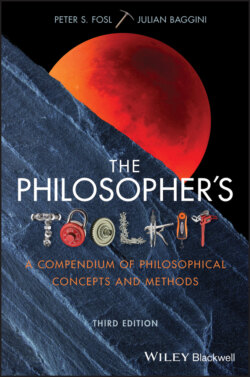Читать книгу The Philosopher's Toolkit - Julian Baggini, Julian Baggini - Страница 90
Self‐refuting criticism
ОглавлениеOne curious and useful feature of the law of non‐contradiction is that, as Aristotle shows in his Metaphysics Book 4, any attempt to refute it presupposes it, and so for Aristotle nothing can be more certain than the principle of non‐contradiction. (See also Plato’s formulation at Republic IV, 436b–437a.)
To argue that the law of non‐contradiction is false is to imply that it is not also true. In other words, the critic presupposes that what he or she is criticising can be either true or false but not both true and false. But this presupposition is just the law of non‐contradiction itself – the same law the critic aims to refute! In other words, anyone who denies the principle of non‐contradiction simultaneously affirms it. It is, in short, a principle that cannot be rationally criticised, because it’s presupposed by all rationality.
To understand why a tautology is necessarily, and in a sense at least, uninformatively true, and why a self‐contradiction is necessarily false, is to understand the most basic principle of logic. The law of non‐contradiction is where those two concepts meet and so is perhaps best described as the keystone, rather than cornerstone, of philosophical logic.
